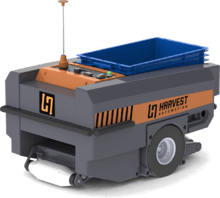Harvest Automation
Harvest Automation, Inc. is a robotics company headquartered in Billerica, MA focused on manufacturing small, mobile material handling robots for industrial applications. Its first products address labor scarcity issues in the Nursery and Greenhouse market as well as the eCommerce Fulfillment market.
History
Harvest Automation Inc. was founded in 2009 by former iRobot employees on the premise that there are many examples of work in the world that are repetitive, strenuous and dangerous and that can benefit from robotic automation. Roomba inventors Joseph Jones and Paul Sandin, and Roomba engineer Clara Vu,[1] founded the company along with Chief Operating Officer Charles Grinnell, who served as Lead Engineer of a $300 million particle detector at CERN – Europe's international physics research center.[2]
Since the formation of Harvest Automation, Inc., the company has received funding from various investors totaling at $30.6 million.
Products & Markets
OmniVeyor HV-100

Harvest Automation's products are branded under the OmniVeyor product line. Harvest Automation’s first product is the OmniVeyor HV-100,[3] providing automated material handling for the $14B [4] Nursery and Greenhouse market. OmniVeyor HV-100 units are designed for operation in both indoor and outdoor environments as typically seen on wholesale greenhouses, hoop houses and nurseries. The robots are intended to reduce production costs as well as increasing overall productivity.[5]
OmniVeyor HV-100 robots automate the task of spacing containerized plants, common to wholesale Nursery and Greenhouse operations. When plants are young they are placed in close proximity to one another on fields in order to conserve resources such as land, water and pesticides. As the plants grow their containers must be spaced apart to allow the plants to develop a uniform and consistent canopy. The task of spacing plants has historically been completed with manual labor.
OmniVeyor TM-100

The OmniVeyor TM-100[6] robot is designed to provide automated material handling for the $300B[7] eCommerce market. OmniVeyor TM-100 robots are designed to work with and among existing workforces and infrastructure and to triple order fulfillment productivity. In contrast to traditional forms of fulfillment center automation such as conveyors, sorters, and Automated storage and retrieval systems, Harvest Automation believes that its OmniVeyor TM-100 robots represent a much more flexible and more easily scalable solution.
The OmniVeyor TM-100 robots work by autonomously handling material movement and sortation and thereby eliminating the need for workers to walk long distances between picking products for order fulfillment. By virtue of its small size and weight and integrated obstacle detection and collision avoidance systems the robot is able to work in the same space as people. The OmniVeyor TM-100 robot will allow for batch and single order processing as well as interleaved replenishment and returns processing.
References
- ↑ Lang, Michelle (July 29, 2011). "Harvest Automation receives $2.5M financing". Boston Business Journal.
- ↑ "Harvest Automation - Management Team".
- ↑ "Harvest Automation HV-100 Product Page".
- ↑ "2012 USDA Census of Agriculture" (PDF). May 1, 2014.
- ↑ "Case Study: Harvest Automation". Robotics Tomorrow. July 31, 2013.
- ↑ "Harvest Automation TM-100 Product Page".
- ↑ "US eCommerce Grows, Reaching $414B By 2018, But Physical Stores Will Live On". May 12, 2014.
External links
| Wikimedia Commons has media related to Harvest Automation. |